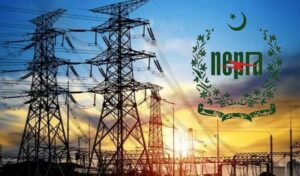
By Muhammad Arif
This is apropos to the news carried by the daily Business Recorder on 10th April 2025 titled “NEPRA grants provisional tariff to KAPCO”.
According to the said story, KAPCO had submitted a provisional tariff petition on the basis of certain negotations held with the Task Force, whereby KAPCO shall be entitled to receive 25 per cent ROE on Take-or-Pay basis while the remaining ROE shall be linked with actual dispatch exceeding 25 per cent. NEPRA simply allowed what has been requested on provisional basis pending full determination.
The story of Kot Addu Power Company Limited (KAPCO) is a textbook example of how ill-conceived privatization and misguided policy decisions can wreak long-term havoc on a country’s economy. Originally a WAPDA-owned and operated thermal power plant developed between 1985 and 1996, KAPCO was not a new investment needing encouragement or risk mitigation—it was an operational, state-funded facility that had already delivered years of service to the national grid.
Yet, in 1996, the Government of Pakistan incorporated KAPCO as a public limited company, setting the stage for one of the most problematic privatizations in the country’s energy sector. Just two years after announcing the 1994 Power Policy—intended to attract new Independent Power Producers (IPPs) through lucrative guarantees of capacity payments and sovereign-backed returns—the Government inexplicably extended the same policy incentives to KAPCO, an existing asset with sunk costs largely recovered. This move defied both economic logic and public interest.
When 36% of KAPCO’s shares, along with management control, were handed over to a subsidiary of the UK-based National Power PLC in 1996 through so-called “international competitive bidding,” it wasn’t just a sale—it was a quiet handover of an already productive public asset bundled with an absurdly generous profit guarantee. By 2005, the Government went further, floating an 18% stake in the company through an IPO, fully exposing the public to the long-term liabilities of capacity payments and fixed returns, while progressively offloading its own accountability.
There was no justification—economic, legal, or moral—for awarding the 1994 policy’s incentives to KAPCO. That policy was tailored for greenfield projects that were taking on risk and adding fresh capacity to the grid. KAPCO, by contrast, had been generating electricity for years and had zero need for the risk-reducing sweeteners that the policy offered especially after it had been privatized and handed over to private management. And yet, it received all the perks: guaranteed capacity payments, sovereign guarantees, and dollar-indexed returns—essentially free profit, backed by the Pakistani taxpayer. As a result, what should have been a lean, commercial transaction turned into a bloated, liability-laden giveaway.
The result? WAPDA was saddled with long-term, unjustified capacity payments for an aging asset it no longer controlled. The Government lost strategic hold over a critical generation facility while absorbing ongoing fiscal obligations. And the public—through ballooning circular debt and tariff hikes—was left to pay the price. The entire transaction undermined the very rationale for privatization, which is supposed to increase efficiency and reduce fiscal burden, not lock in guaranteed private profits at public expense.
In an article published by Dawn titled “IPPs’ experience: can it be termed a success?”, it was rightly pointed out that the post-1994 IPP experience left a trail of structural inefficiencies and financial distress. KAPCO is the most egregious manifestation of this trend. Unlike other IPPs that at least brought in new infrastructure, KAPCO’s privatization amounted to packaging a public asset in gold foil and handing it over to the private sector with a bow on top.
To make matters worse, after offloading its shareholding, the state continued to bear the brunt of KAPCO’s fixed costs. No serious restructuring took place to bring the PPA in line with the plant’s operational realities. Even after the expiry of KAPCO’s original PPA term, stopgap extensions were granted rather than addressing the fundamental issue: should a depreciated plant, already paid for by public funds, still be drawing full-capacity payments in a system crying out for reform?
This wasn’t just a bad deal—it was a betrayal of the public mandate. If privatization was deemed necessary, then KAPCO should have been sold on “as-is” terms reflecting its depreciated value and operational status—without capacity payments or guaranteed returns. Alternatively, if the Government insisted on maintaining the 1994 policy framework, it should have at least retained controlling ownership to manage long-term liabilities. Doing both—privatizing and then layering on policy incentives—was a reckless contradiction that created a dual burden: surrendering control while keeping the liability.
The consequences continue to echo through Pakistan’s energy sector. The circular debt crisis, inflated consumer tariffs, and lack of fiscal space for renewable integration all trace back, in part, to decisions like the KAPCO deal. It was neither reform nor investment—it was a politically convenient, financially disastrous transfer of public value to private hands.
Unless we call out these flawed transactions for what they were—short-sighted, opportunistic, and structurally damaging—there is little hope for meaningful reform in Pakistan’s energy landscape. KAPCO isn’t just a footnote in the history of privatization. It is the cautionary tale we keep refusing to learn from. (This article reflects author’s opinion and not necessarily the views of WNAM )
Author is energy lawyer and consultant, he can be reached at [email protected]| cell: 0333 5191381


